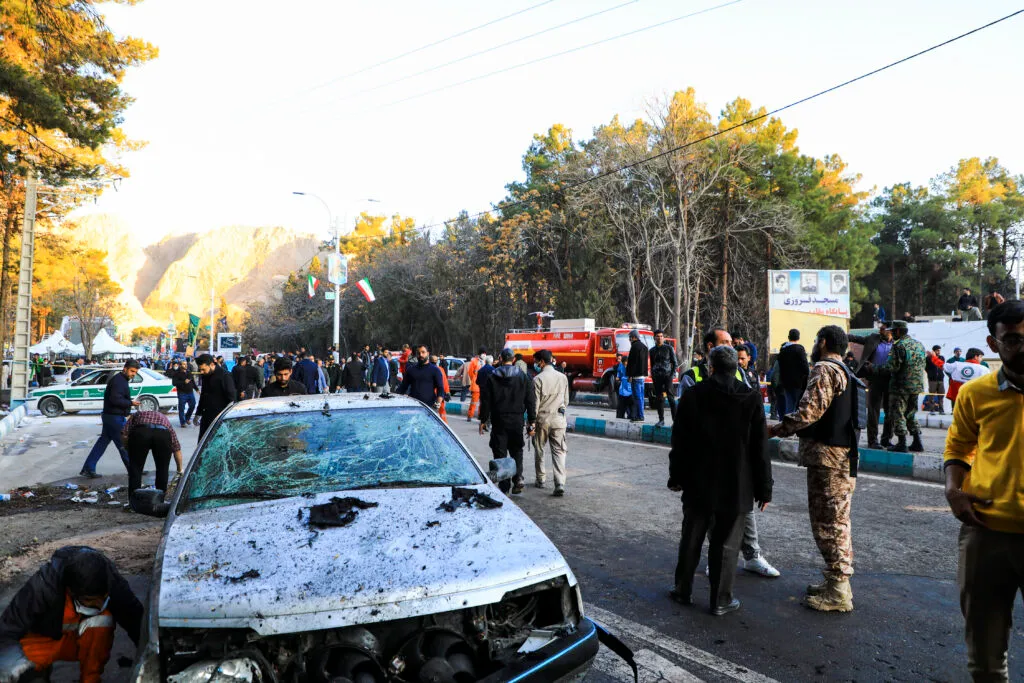The U.S. military continues to have a presence in Iraq years after its territorial defeat of the Islamic State, though that could soon change.
U.S. and Iraqi government leaders will begin meetings of the U.S.-Iraq Higher Military Commission in the coming days, Defense Secretary Lloyd Austin announced on Thursday. They agreed to form the HMC in August 2023.
A senior U.S. defense official told reporters that the dialogue “is not a negotiation about the withdrawal of U.S. forces from Iraq.”
Why is the U.S. still in Iraq?
The U.S. military has roughly 2,500 troops in Iraq, who are there as a part of the Combined Joint Task Force – Operation Inherent Resolve. Their mission is to ensure ISIS is not able to reconstitute, though they are in a train, advise, and assist role.
“During that meeting, the United States and Iraq committed to start the HMC to discuss how the Coalition’s mission to defeat ISIS will transition on a timeline that considers three key factors: the threat from ISIS, operational and environmental requirements, and the Iraqi security forces’ capability levels,” Austin said. “U.S. military personnel are in Iraq at the invitation of the Iraqi government, as part of Operation Inherent Resolve’s mission to advise, assist, and enable the Iraqi security forces in their ongoing fight against ISIS. The United States remains committed to a secure, stable, and sovereign Iraq.”
The U.S. and its coalition partners carry out missions targeting ISIS. In November, these forces carried out 24 partnered operations that resulted in the deaths of three ISIS operatives and the detention of 14 more. They carried out 53 missions in September and October that resulted in the deaths of 10 ISIS militants and 33 fighters detained.
Does ISIS still pose a threat?
Nearly 10 years after the U.S. kicked off its counter-ISIS mission, the terrorist group is a fraction of what it once was both in terms of its influence and its territorial hold.
Gen. Michael “Erik” Kurilla, commander of the U.S. Central Command, told lawmakers in March 2023 that the Islamic State Khorasan Province, the Afghanistan branch of the terrorist group, will have the ability to launch attacks against U.S. interests outside in the region in less than six months “with little to no warning.”
More recently, Lt. Gen. Alexus Grynkewich, commander of U.S. Air Forces Central, told reporters in October 2023 that there’s “been an increase in risk.”
ISIS-K is “one of the most capable elements of ISIS right now and something that we need to keep a close eye on,” Grynkewich said. “We’ve got a good feel overall of what their capabilities are. But again, you always want more, right.”
ISIS-K carried out duel suicide bombings earlier this month in the southeastern town of Kerman, Iran, targeting mourners who were commemorating the anniversary of the killing of Islamic Revolutionary Guard Corps commander Qassem Soleimani. The bombings killed more than 80 people, and it marked the deadliest terrorist attack inside Iran since the Islamic Revolution in 1979.

ISIS is a hard-line Sunni group and it has clashed with Shiite groups, which includes an overwhelming majority of the Iranian population.
Attacks against U.S. forces by Iranian-supported militias and retaliation?
Iranian-backed militias in Iraq and Syria have carried out more than 150 attacks on U.S. forces in both countries, and U.S. forces have carried out retaliatory airstrikes.
The continued attacks against U.S. forces, which have injured dozens of troops, began in mid-October following the start of the Israel-Hamas war. U.S. forces carried out strikes in Iraq on Wednesday targeting the militia group that attacked U.S. troops days earlier.
U.S. military officials have maintained that they will not be deterred from taking action to protect U.S. troops and facilities, while the strikes, including one that targeted a militia leader in Baghdad, have also angered some Iraqi officials.
CLICK HERE TO READ MORE FROM THE WASHINGTON EXAMINER
The office of Iraqi Prime Minister Mohammed Shia’ al Sudani said on Jan. 10 that it would begin the process “to end the presence of the international coalition forces in Iraq permanently,” though Maj. Gen. Patrick Ryder, Pentagon spokesman, affirmed as recently as Jan. 24 that he was “not aware of any official notifications to the department.”
The U.S.-Iraqi talks are “not connected to recent events,” the senior defense official said, adding that the attacks “have really not influenced the decision of the United States in Iraq to convene this forum.”
